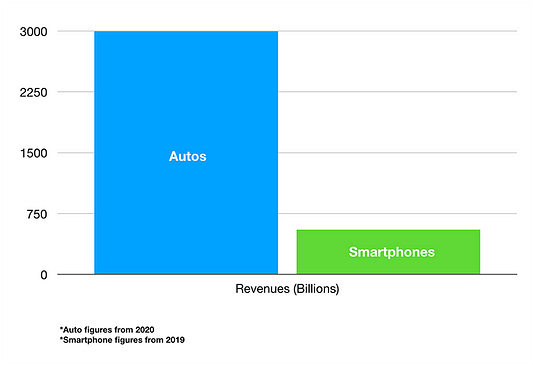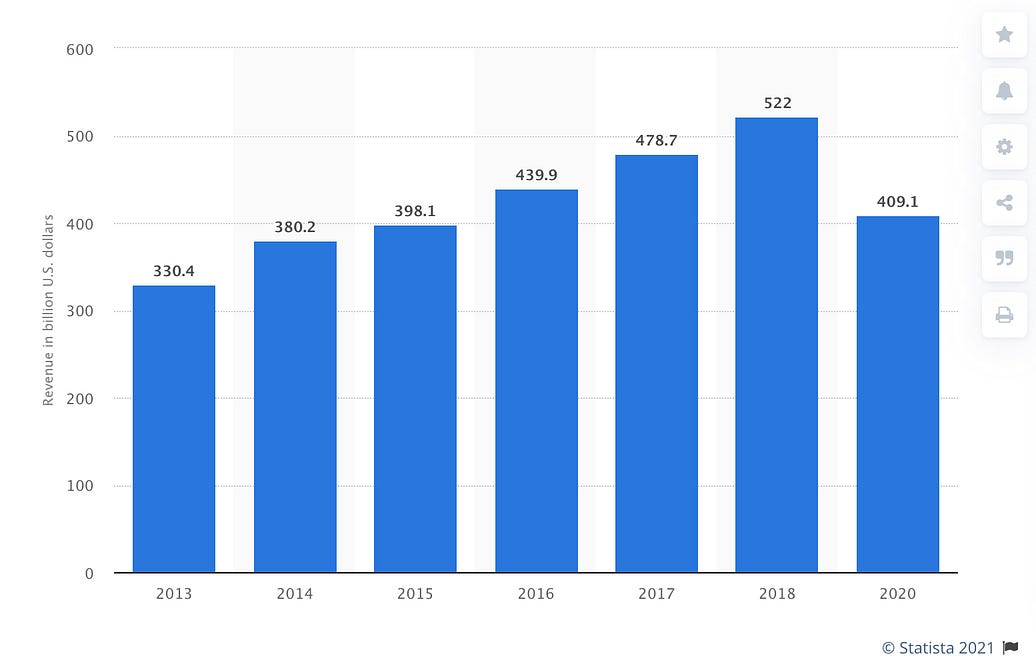Apple makes computers and phones. Tesla makes cars and batteries. One has been at the forefront of computing and communications products, while the other is at the cutting edge of the automotive industry. Apple is well known for taking ideas and reinventing products that set a trend in the computer industry. Tesla is a bold pioneer in developing unconventional technology in the auto industry. The comparisons are quite remarkable, but they are not directly in competition with one another.
As an innovator, this might be a good time for Apple to enter the auto industry. Apple has made it no secret about their plans at developing their own car. Their project started in 2014 (codenamed Project Titan), and it seemed at first like it was for testing driverless cars. They just don’t bring too much attention to it, keeping things below the radar. More excitement was generated after news reports surfaced of the details of developing an electric car. From what has been reported, it will be electric with self-driving capabilities. Apple insider Ming Chi-Kuo believes that an Apple Car is likely around 2025 at the earliest.

It may not make sense if you are comparing it like apples and oranges. That is if you look at Apple as just a computer company. The fact is Apple has plenty of capital for investing into new ventures, and that includes developing electric cars. They have already started building a team that includes former engineers from Tesla and other automakers. Apple tends to be secretive about its projects, so there was just speculation that Apple is experimenting on driverless technology. For others it was already a hint at what Apple is actually trying to do. That means building their own car.
The Potential In The Auto Industry
The size of the mobile market (smartphones) peaked at around $522 Billion (2018). The automobile industry (including gasoline, diesel and EV) in total is valued at over $3 Trillion in global sales by 2020, projected to reach $9 Trillion by 2030 (per Statista). According to Morgan Stanley lead analyst Katy Huberty:
“… it makes sense for Apple to enter the car market because of the total size of the industry.”
Both markets have been affected by COVID-19 to a large extent, with drop in sales from the previous year. When it comes to rebounding sales, the auto industry has a much larger market.


For Apple, smartphones have been one of its most profitable line of business. The iPhone disrupted the mobile industry when it was released. It turned out to be the most profitable product line for Apple, compared to their other products. It prioritized the development and marketing and it paid off. Perhaps they can do the same with cars. On that note, Tesla is now the world’s most valuable automaker ($809.8 Billion as of posting) ahead of Toyota and General Motors in terms of valuation (not sales).
With smartphone sales being one of Apple’s largest revenue contributions, it is not exactly going to sustain the growth of the company moving forward. This is because the market is projected to decline, not just due to COVID-19 hurting sales, but due to more competition in the smartphone market in general. The industry has matured and the demand is still there, but it’s just not going to continue driving larger profits. There might also be little room for growth, as competition from Huawei and Samsung become tighter. Apple has dropped in rankings in terms of global shipments and sales. This would be a reason for Apple to enter the auto industry due to the growth potential.
Like Tesla, Apple can also become a direct seller of their car. That business model has worked well for Tesla without third party dealerships or franchising. Directly selling to customers is an effective strategy that would allow Apple to be their own dealer. It could be like an Apple Store, except for cars.
The EV Path
With new regulations on carbon emissions, policies are shifting towards encouraging and incentivizing electric vehicles (EV). There will be less demand for fossil fuels as alternative sources for energy are being explored and utilized. The push for cleaner and greener technology is an incentive for EV automakers. The US Government had been subsidizing Tesla on this initiative amounting to $2.44 Billion. There were also EV tax credits as high as $7,500 for car owners.
The tax credit for Tesla has finished its course. For new EV automakers it is much different. This opportunity encourages car buyers to go electric due to the tax credit among the benefits (other than cost saving from gas). When Apple does hit the market with their EV, the terms may be different than it is at the moment. A new administration may be more friendly to EV and give Apple a tax credit plan for a certain number of vehicles. These tax credits can help to boost sales and allow EV automakers to establish their market. Since Apple is a well know brand, they can easily capture the market but let us not forget that cars are not something Apple is known for. They still have to prove their worth.
Challenges To Apple Car
Since Apple is not a car company, they will have to start with First Principles. They have the team to develop and build a car, so technology is not much of a problem. The major problem is how to mass produce the car. Perhaps Apple can learn from Tesla’s experience after facing problems producing the Model 3 at scale. Tesla did reap the benefits of their “production hell” with profits starting in Q3 of 2018 ($312 Million). The key here is to find the way to produce at scale in order to increase revenues. Another way is to produce cars for a niche market, like for exotic car enthusiasts. It just doesn’t seem like Apple is just going to produce a few exotics a year to appease a small market when there is a bigger fish to fry.
An advantage Tesla has over Apple is in battery technology. Tesla has come up with a breakthrough in battery design that can reduce the cost per kWh in half ($100/kWh). That brings the price of an EV down to $25,000, which is about the same price level as a conventional car in the market. Tesla is very much ahead in this game, so Apple may either have to build a better battery or source it from other manufacturers.

Tesla has successfully introduced vertical integration into the production of their EV. Likewise, Apple can do the same. This can lead to more economies of scale and drive the production costs down which can also lower the sales price per vehicle. Apple can develop a new ecosystem around its EV, built from the ground up. To build their first car, Apple would have to establish their supply chains and then develop the process accordingly.
Finding a manufacturing location is the next thing to consider. If they can build their EV at lower cost overseas, it takes away jobs from the US. A domestic production facility, like what Tesla have done in Austin (TX), would be more favorable for the US economy. They may even explore a joint venture or partnership with automakers to build the body as part of the production process. In related news, there are reports that Apple is in talks for a partnership with Hyundai to build the Apple Car. Location and partners will still have to be considered, so there is nothing official.
Competition Brings Innovation
The good thing about this is Apple can bring either a disruption to the entire auto industry or just more competition for EV automakers like Tesla. This is always welcomed, since it gives consumers more choices for EV. The expectation people might have from Apple is the same way they transformed the mobile phone into the smartphone. This entry into the auto industry could lead to a smartcar. There is no benchmark to base the Apple Car on, but we do know for sure that the competition is getting tighter and there is plenty of room to grow in the EV market.
The incoming US presidential administration could be favorable to EV. At the moment according to Statista (as of June 2020), Tesla has 17.95% of the global EV market share based on sales. The global EV market, according to Allied Market Research was worth $162.34 Billion in 2019 with projected figures to $802.81 Billion in 2027. The US can further accelerate EV adoption with greener policies that can affect the auto industry. Prior to the COVID-19 pandemic of 2020, EV sales had risen by up to 65%. Even starting at 2% market share will be big for Apple. That is valued at around $180 Billion in a $9 Trillion auto market (includes non-EV) by 2030. That is actually more revenue than iPhone sales alone in fiscal year 2019 (iPhone 2019 sales revenues were $55.96 Billion).

With a competitor like Apple, the EV market will have more options and better choices. If Apple can build a better EV, it also influences the competition to follow. EV production will lead to designs that provide more efficiency and cost savings to consumers. Scaling production also brings prices down, while standards for quality will also increase. With advanced AI research, Apple engineers can bring new developments to self-driving car systems. That means safer and more reliable products as well.
Swipe To Drive
The vision of having an Apple Car has already been generating plenty of excitement. It adds to the overall Apple ecosystem, allowing iPhone app integration that makes it as simple as “swipe to drive”. To be realistic though, the established automakers and Tesla in particular are very far ahead in terms of development. Apple will have to compete to deliver on the performance and features. This is their first time making cars, so we won’t know for sure what to expect. It is not too late for Apple to enter this emerging and expanding market, specifically in EV. This is an opportunity for the tech giant.

